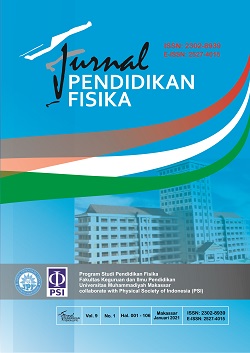The Effect of E-Learning Application through the Use of Whatsapp-Assisted Edmodo on the Students’ Learning Outcomes in the Concept of Sound Waves
DOI: https://doi.org/10.26618/jpf.v9i1.4361
Edmodo, E-learning, Learning Outcomes, Whatsapp Assistance
Abstract
This study aims to find out the students’ learning outcomes in the application of e-learning through the use of WhatsApp-assisted Edmodo in the concept of sound waves. In addition, students' responses to the treatments given were also observed for the sake of evaluation. This research used a quasi-experimental research design carried out at SMA Negeri 1 Gorontalo in the even semester of the 2019/2020 academic year. The subject of the research was class XI IPA 8 consisting of 20 students. Tests were administered to students to obtain data of the students’ learning outcomes. The data collected were then analyzed by using normality test and statistical t-test. Based on the research results, it is known that the t-value (5.53) is greater than the t-table (1.72), so H0 is accepted and H1 is rejected. It means that there is a significant positive effect of using whatsApp-assisted edmodo on learning outcomes in the concept of sound waves. It can be seen from the difference of mean score between the pretest and posttest scores of the experimental class. Therefore, it can be concluded that the increase in students’ learning outcomes on the concept of sound waves is in the strong effect category.References
Al-kathiri F. (2015). Beyond the Classroom Walls Edmodo in Saudi Secondary School EFL Instruction, Attitudes and Challenges. Journal Canadian Center of Science and Edocation. 8(1), 189-204.
Al-said, K. M. (2015). Student’s Perceptions of Edmodo and Mobile Learning and their Real Barriers towards them. The Turkish online Jurnal of Educationnal Technology (TOJET). 14 (2), 167–180.
Arota Anjas., Mursalin., Abdul Haris Odja. (2020). The effectiveness of e-learning based on SETS to improve students’ critical thinking skills in optical instrument material. Journal of physics: Conference Series. Conf. Ser. 1521 022062.
Hanum, Numiek Sulistyo. (2013). E-Learning Effectiveness as Learning Media (Evaluation Study of E-Learning Learning Model of Telkom Sandhy Putra Purwokerto Vocational School). Journal of Vocational Research. Vol 3 No 1.
Kamarga, Hansiswany. (2011). Constructing Online Based History Learning: Comparison Of Learning Content Management System (LCMS) To Learning Management System (LMS). International Journal of History Education. Vol. XII, No. 2.
Kong, S. C., & Song, Y. (2014). The Impact of a Principle-based Pedagogical Design on Inquiry-based Learning in a Seamless Learning Environment in Hong Kong. Educational Technology & Society, 17(2), 127–141.
Rusli Muhammad, Dadang Hermawan, Ni Nyoman Supuwiningsih. (2017). Innovative Multimedia Learning Basic Principles And Development Models. Yogyakarta: Publisher Andi.
Sahidillah, Muhammad Wildan & Miftahrrisqi, Prarasto. (2019). Whatsapp as a digital media for student literacy. Varia Education. Vol. 31 No.1.52-57.
Shams Abadi, B. B., Ahmadi, S. D., & Mehrdad, A.G. (2015). The Effect of Edmodo on EFL Learner’s Writing Performance. International Journal of Educational Investigations. 2(2), 88–97.
Vera Dewi Kartini Omposunggu & Nilam Sari. (2019). The Effectiveness of Using Edmodo-Based E-Learning on Mathematics Communication Skills. Curere's Journal. Vol. 3 No.2.
Yazdi, Mohammad (2013). E-Learning as Information Technology Based Interactive Learning Media. Faristek Scientific Journal. Vol. 2 No. 1.
Downloads
Published
How to Cite
Issue
Section
License
Copyright (c) 2021 Jurnal Pendidikan Fisika

This work is licensed under a Creative Commons Attribution-ShareAlike 4.0 International License.
Copyright:
Authors who publish with this journal agree to the following terms:
1. Authors retain copyright and grant the journal right of first publication with the work simultaneously licensed under a Creative Commons Attribution-ShareAlike 4.0 International License that allows others to share the work with an acknowledgement of the work's authorship and initial publication in this journal.
2. Authors are able to enter into separate, additional contractual arrangements for the non-exclusive distribution of the journal's published version of the work (e.g., post it to an institutional repository or publish it in a book), with an acknowledgement of its initial publication in this journal.
3. Authors are permitted and encouraged to post their work online (e.g., in institutional repositories or on their website) prior to and during the submission process, as it can lead to productive exchanges, as well as earlier and greater citation of published work.
Licence:
Authors are free to:
1. Share: Copy and redistribute the material in any medium or format
2. Adapt: Remix, transform, and build upon the material for any purpose, even commercially.
The licensor cannot revoke these freedoms as long as the authors follow the license terms, which include the following:
1. Attribution: You must give appropriate credit, provide a link to the license, and indicate if changes were made. You may do so in any reasonable manner, but not in any way that suggests the licensor endorses you or your use.
2. ShareAlike: If you remix, transform, or build upon the material, you must distribute your contributions under the same license as the original.
3. No additional restrictions: You may not apply legal terms or technological measures that legally restrict others from doing anything the license permits.
Jurnal Pendidikan Fisika is licensed under a Creative Commons Attribution-ShareAlike 4.0 International License.






